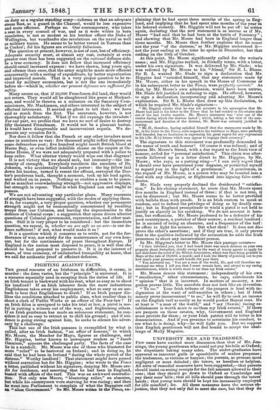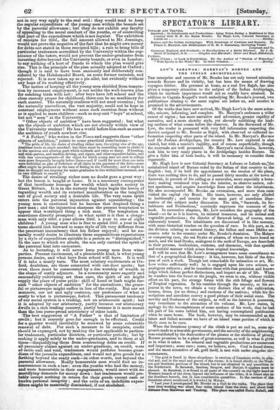UNIVERSITY MEN AND TRADESMEN.
FEW cases have excited more discussion than that of Mr. Jen- nings, the young gentleman who could not pay his bills at Oxford; the disputants taking many sides. The under-graduates have appeared as innocent gulls or spendthrifts of malice prepense ; the tradesmen, as victims or harpies ; the parents, as persons most negligent or most deluded ; the tutors, as heedless or helpless. All sorts of remedial measures have been suggested,—that parents should insist on seeing receipts for the full amount allowed to their sons • that they should go down to Oxford or Cambridge and pay ;heir sons' bills ; that all bills should pass through the tutors' hands ; that young men should be kept too incessantly employed for idle mischief; &c. AU these measures have the serious ob- jection, that they not only fail to meet the case, but that they do not in any way apply to the real evil : they would tend to keep the regular expenditure of the young men within the bounds set by the parental allowance ; but they do not exhibit any faculty of appealing to the moral conduct of the youths, or of controlling that part of the expenditure which is not regular. The exhibition of receipts for 2501., the full amount allowed to Mr. Jennings, would not prove the negative of the fact that he might owe money for debts not stated in those receipted bills; a rule to bring bills of particular tradesmen accredited by the University within the cog- nizance of the tutors, would not prevent the under-graduates from incurring debts beyond the University bounds, or even in London ; to say nothing of a host of frauds to which the plan would give rise. This is the principle of the plan actually adopted at Oxford ; though it is said to have been anxiously and deliberately con- sidered by the Hebdomadal Board, on some former occasion, and rejected. It is now taken up as a pie alter, but evidently without any hope of its working effectively. The notion of keeping all the young men shielded from tempta- tion by incessant employment, is not unlike the well-known plan for catching birds with salt: after boys have left school and the close custody proper for childhood, there can be no machinery for such control. The naturally studious will not need coercion ; but the naturally unstudioust the vast majority, could not be kept in constant employment without some such coercion from without as is applied to mere children—such as may snit "boys" at school, but not "men" at the University.
" Other objects of ambition have been suggested : but what are the objects of ambition which are not already within view of the University student I He has a world before him such as courts the ambition of youth nowhere else.
" A Father," who writes in the Times and suggests these "other objects of ambition," points to some practical conclusions- " The pride of life, the desire of rivalling richer men, the crying vice of the age, doubtless tends to much mischief; but there must be something more to clothe it in the specious and alluring garb which misleads and ruins so many. If hunting, and wine-parties, and tandem-driving, and cigars, and other expensive habits, met with less encouragement—if the object for which young men are sent to college were more frequently. brought before them—and if credit for more than one term were forbidden on pain of forfeiture of all claim to the payment of the debt—some effect might be produced on the tone of feeling in the University; and it might in time be thought not singular for under-graduates to live within their incomes, and be very difficult to exceed it." The desire of rivalling richer men no doubt goes a great way ; but the lesson is taught at home. It is a necessary consequence of that inordinate homage for wealth which marks society in Great Britain. It.is in_ the nursery that boys begin the lesson of regarding wealth and its external manifestation as the tangible test of good society and a desirable life. The very same spirit enters into the parental injunction against squandering : the young man is cautioned lest he become that despised thing a poor man ; and the injunction sharpens the present temptation to appear that worshiped thing a rich man. The temptation is sometimes directly prompted : in what spirit is it that a clergy- man with only 8001. a year allows 2501. a year to one of eight children t A young man who is free to spend 2504 a year in his teens should look forward to some style of life very different from the procreant incumbency that his father enjoyed ; and he na- turally would desire to illustrate those supposititious expectations by a style of expenditure suitable to a person so "distinguished." In the case to which we allude, the son only carried the spirit of the paternal hint into caricature. As to lecturing, it will never keep young men from wine- parties. Present excitement, of a pleasurable kind, is what young persons desire, and what boys from school will have. It is well If it take a manly turn. The most salutary excitements at Ox- ford, doubtless, are those connected with out-door sports ; but even those must be consecrated by a due worship of wealth in the shape of costly adjuncts: In a community more eagerly and successfully cultivating art than ours, the spirit of art might supply the place of purse pride : skill of hand or limb might fur- nish ' other objects of ambition" for the unstudious •' the grace- ful or picturesque might suffice in lieu of the costly. But our set manners, our set and ugly costume, our preference of what is costly to what is picturesque, forbid. This paramount tendency of our social system is a trading, not an aristocratic spirit ; but it is adopted by our aristocracy, partly because our aristocracy dwells in a rich trading country, partly because it is more recent than the less purse-proud aristocracy of other lands. The best suggestion of "A Father" is that of limitation of credit ; but it scarcely goes far enough to be effectual. Credit for a quarter would inevitably be renewed by some colourable renewal of debt. For such a measure to be complete, credit should be expunged, not by making the law applicable to particu- lar tradesmen, particular districts, or particular periods ; but by making it apply solely to the under-graduates, and. to them at all times—disqualifying them from contracting debts on credit. If all pecuniary claims against an under-graduate, on credit, were ab tnitio null and void, tradesmen would perforce become guar- dians of the juvenile expenditure, and would not give goods for a farthing beyond the ready cash—in, other words, not beyond the parental allowance. Really honourable men would find no in- convenience in such a law: even the youths who had the money, and were honourable in their engagements, would meet with no mortifying demands for money down : but tradesmen would pro- bably accept nothing in return for their goods except cash or known personal integrity ; and the evils of an indefinite expen- diture might be materially diminished, if not abolished.



























 Previous page
Previous page